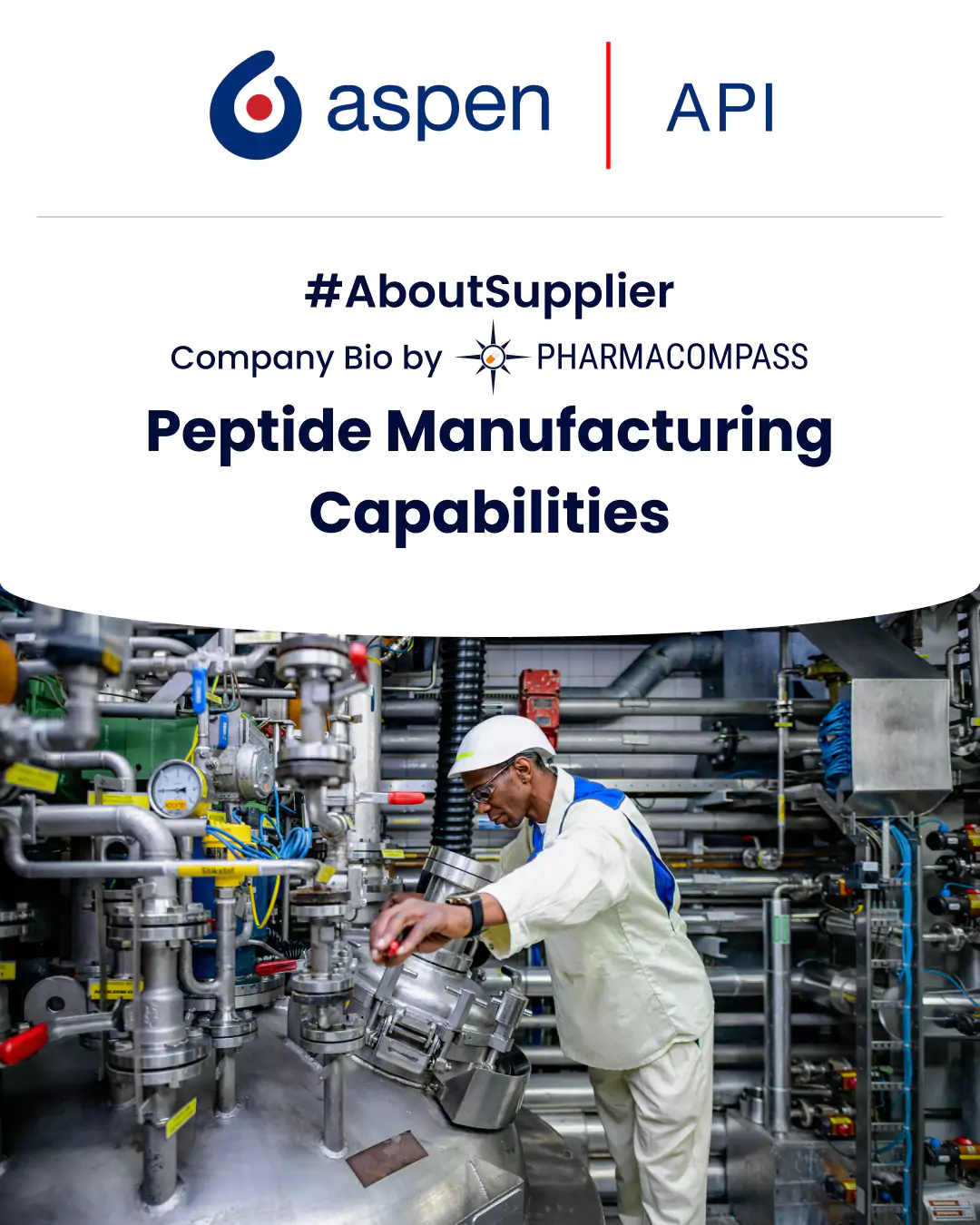
By PharmaCompass
2022-03-15
Impressions: 4551
Overview of custom peptide synthesis & contract manufacturing services & more on Aspen API's CDMO & CMO services for cGMP peptides on PharmaCompass.
Q.1 What are peptides?
A peptide is a compound of two or more amino acids in which a carboxyl group of one is united with an amino group of another. Naturally occurring peptides may serve as hormones, growth factors, neurotransmitters, ion channel ligands and anti-infectives; peptide therapeutics mimic these functions. Many pharmaceutical and cosmetic products contain different peptides for their potential anti-aging, anti-inflammatory, fat burning and muscle-building properties.
There are several physiological activities influenced by bioactive peptides. The biological activities are controlled by the type, number, progression and nature of the amino acids constituting the peptides. Most peptides between five and sixty amino acids are produced by standard solid phase peptide synthesis (SPPS) procedures. Shorter length peptides (up to 10 amino acids) are manufactured by solution phase synthesis (liquid phase peptide synthesis). For longer peptides (up to 120 amino acids), segment condensation and ligation techniques are used.
Peptide active pharmaceutical ingredients (APIs) are highly selective. They are effective at lower doses and accumulate in low levels in body tissues, thus reducing toxicity levels. However, peptide-based drugs are short-lived. So, doses must be administered more frequently. Most peptide active pharmaceutical ingredients (APIs) are administered parenterally as their oral bioavailability is extremely low. Today, there are over 40 peptides in the pharmaceutical market and over 100 in different clinical development phases.
Although pharmaceutical peptides were first introduced decades ago, contract peptide API manufacturing is still considered a nascent market with promising therapeutic capabilities (as peptide therapeutics) and a huge potential for the contract API manufacturing industry. Pharmaceutical peptide manufacturing has become much more cost-efficient and capable since the emergence of synthetic peptide APIs.
Custom peptide production offers significant advantages over many expensive recombinant techniques, including a much wider diversity of chemical peptides at far more economical rates. Peptides synthesis services and applications are gaining popularity as a result of the development in the fields of biotechnology and bioengineering. Synthetic peptide APIs have several important applications in biochemistry, molecular biology, immunology and medicine.
Many researchers are taking renewed interest in contract peptide API manufacturing as a result of new technologies, strategic custom peptide development services, advances in the areas of formulation and enhanced drug delivery technology of custom peptides.
Peptides are a complex class of drugs and have proven to be a challenge from the manufacturing point of view. There are several pharmaceutical contract development and manufacturing organizations (CDMOs) and contract manufacturing organizations (CMOs) that offer peptide therapeutics, GMP-grade peptides and CDMO services for bulk peptide manufacturing, peptide contract manufacturing, custom peptide development and GMP contract peptide manufacturing.
Q.2 What are the different approaches for peptide synthesis?
The key to large scale peptide production is to optimize process development and achieve highly efficient conversion at every amino acid coupling to produce high-purity crude synthetic peptides. Peptides are produced using solid phase peptide synthesis (SPPS), liquid-phase peptide synthesis, hybrid solid/solution phase synthesis, fragment condensation and other novel technologies.
Different approaches to chemical peptide synthesis:
Solid- and liquid-phase synthesis are the most commonly used methods for pharmaceutical peptide manufacturing:
- LPPS - Liquid-phase peptide synthesis
Liquid-phase peptide synthesis is a classical approach to custom peptide synthesis, but has now been replaced in most labs by solid-phase peptide synthesis. However, it is still used to produce peptides in large-scale for industrial purposes. The liquid-phase approach is used for the synthesis of short peptides, such as di- and tripeptides, and C-terminally modified peptides, such as enzyme substrates.
Solution phase synthesis (liquid phase peptide synthesis), on the other hand, can be advantageous as product quantities increase. This methodology can be problematic for synthesizing longer and more complex peptides, but is useful for shorter peptides and fragments. However, SPPS is not perfect, especially in terms of greenness.
- Solid-phase Peptide Synthesis (SPPS)
Synthetic peptide active pharmaceutical ingredients (APIs) can be synthesized automatically using solid phase peptide synthesis (SPPS). It entails the stepwise addition of protected amino acids to a growing peptide chain bound by a covalent bond to a solid-state resin particle. This method allows unreacted reagents to be removed by washing without causing any product loss.
Solid-phase peptide synthesis (SPPS) is the preferred approach for chemical peptide synthesis, allowing routine synthesis of almost any type of peptide sequence, including complex or cyclic peptide products. It is used to manufacture epitope-specific antibodies, map antibody epitopes and study enzyme binding sites or to design and synthesize novel peptide- or protein-mimetics as well as enzymes. SPPS can be automated and is scalable, which has led to its extensive adoption in the pharmaceutical sector, and a range of marketed peptide-based drugs are now being produced using this method.
Easy purification, shorter process development, higher cost efficiency, rapid generation of linear peptide intermediates and the availability of fully automated production techniques are all advantages of solid phase peptide synthesis (SPPS). It can also be competitive in large-scale processes and used to produce longer sequences and complex peptides with elaborate side chains.
Hybrid solid/solution phase synthesis
To manufacture peptides, the hybrid solid/solution phase synthesis methodology combines the two different methodologies together. For example, to make longer chain peptides, small peptides (containing 4 - 10 amino acid) segments would be produced using solid-phase methods on resins and then segment condensation takes place in solution to make the full peptide sequence.
Q.3 What are the challenges included in the production of cGMP peptide APIs?
Today, there are more than 60 peptides in the pharmaceutical market. Recent accomplishments, together with the traditional benefits of cGMP peptides (high biological activity, high specificity and low toxicity), have led pharmaceutical companies to re-focus their attention on peptide therapeutics and peptide-based drugs. Therefore, several serious diseases can be treated using the potential next generation of peptide APIs. But Peptides are a complex drug class and have historically proven challenging from a manufacturing standpoint.
Producing GMP peptide APIs is complex. In order to deliver a high quality product, many challenges must be addressed. Peptide API production challenges are noted below:
- Peptide API production requires high production cost & infrastructure requirements.
- Peptide synthesis and peptide API manufacturing is a multi-step complicated process which involves dozens of chemical steps followed by a rigorous purification campaign.
- Synthesis of hydrophobic peptides pose additional challenges since aggregation of growing peptide chains is a common issue.
- Peptides have a secondary structure which may result in aggregation, and an impurity profile with high similarity to the API and to each other. Bioactivity determination using complex methods may be required for development.
- Peptide Active Pharmaceutical Ingredients (APIs) degrade rapidly in the human body and lack oral dosing delivery mechanisms as a result.
- Other pharmacodynamic limitations with peptide active pharmaceutical ingredients (APIs) are short half-life, rapid hepatic clearance, high hydrophilicity, etc.
- Regulatory guidelines, such as the ICH Q3A, exclude peptides. Manufacturing GMP peptide APIs is complex and no specific guidelines are in place to ensure high-quality production.
The chemical ligation methodologies and hybrid SPPS/LPPS strategies can solve some of these problems, but there is clearly still a need for alternative approaches and technologies that could ultimately give overall efficiency gains and reduce the environmental impact of peptide synthesis and peptide contract manufacturing.
There are various contract development & manufacturing organizations (CDMO) and Contract manufacturing organizations (CMO) to outsource custom peptide development, GMP contract peptide manufacturing and contract peptide API manufacturing, from clinical development to commercial manufacturing.
Q.4 What pharmaceutical peptide manufacturing services does Aspen API offer?
Aspen API is a contract development & manufacturing organization (CDMO) which provides development, up-scaling and commercial manufacturing for peptide APIs, complex high potency APIs (HPAPIs) and cytotoxic APIs, along with narcotics and other established APIs. At its site in Aspen Oss, the Netherlands, it has an extensive experience and a solid reputation in bulk peptide manufacturing, peptide contract manufacturing and producing cGMP peptides, with batch to batch reproducibility combined with high yields and high purity profiles.
Aspen API, which has one of the world’s largest capacities for bulk peptide manufacturing, is a peptide active pharmaceutical ingredients (APIs) manufacturer. It is a quality-focused contract development & manufacturing organization (CDMO) and contract manufacturing organization (CMO) which specializes in developing highly efficient manufacturing processes for peptide-based APIs, from very small to very large scales in compliance with cGMP (current Good Manufacturing Practice). It has experience in both solutions and solid-phase synthesis. In addition, Aspen API has a green method for the large-scale manufacturing of peptides in solutions (GC-LPPS).
Aspen API has around 50 years of experience and a solid reputation in producing cGMP peptides and peptide contract manufacturing. Its cGMP (current Good Manufacturing Practice) production facilities are able to produce GMP-grade peptides from grams to kilos to tons to support clinical development and commercial demands. All the facilities of Aspen API have been successfully inspected and approved by international health authorities, including the US FDA, EDQM, the Dutch Health authorities and the PMDA as well as by its customers.
Aspen API’s peptide capabilities
- Aspen API has patented a green continuous method for large-scale manufacturing in solution phase synthesis (liquid phase peptide synthesis).
- For peptide synthesis and manufacturing, it has stainless steel and glass-lined reactors ranging from 100 to 1,500 liters.
- Peptide purification techniques that can increase the resolution between related substances and the API are critical for establishing identity, purity & assay – and for increasing the preparative output. For purification, Aspen API uses ion exchange chromatography and reverse-phase preparative HPLC columns up to 45 cm in diameter.
- Final isolation is achieved using tray lyophilizers with a capacity of up to 100 liters.
Aspen API has developed a patented method for green and large scale manufacturing of peptides (GMP-grade peptides) in a solution called Green Continuous Liquid Phase Peptide Synthesis (GC-LPPS). GC-LPPS combines the advantages of the classical solution-phase synthesis with the solid-phase approach. This enables a highly efficient synthesis method that is easy to scale up and yield products of reproducible high purity.
The PharmaCompass Newsletter – Sign Up, Stay Ahead
Feedback, help us to improve. Click here
Image Credit : Biosynthesis, tech advancements by PharmaCompass is licensed under CC BY 2.0
“ The article is based on the information available in public and which the author believes to be true. The author is not disseminating any information, which the author believes or knows, is confidential or in conflict with the privacy of any person. The views expressed or information supplied through this article is mere opinion and observation of the author. The author does not intend to defame, insult or, cause loss or damage to anyone, in any manner, through this article.”





